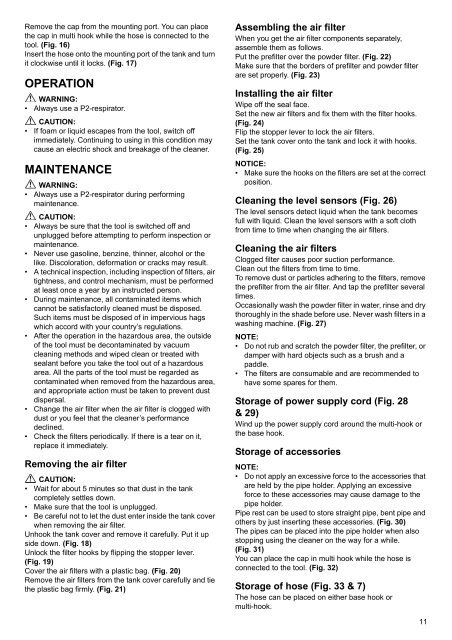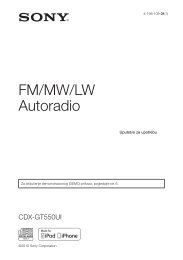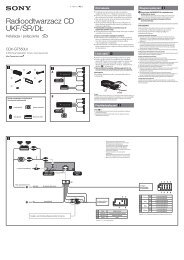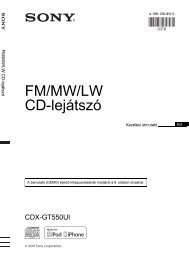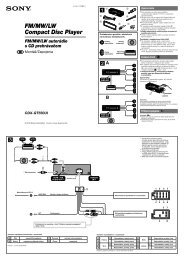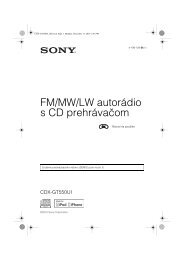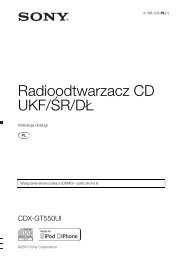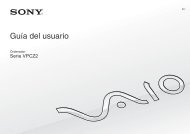Makita ASPIRATORE - VC3211MX1 - Manuale Istruzioni
Makita ASPIRATORE - VC3211MX1 - Manuale Istruzioni
Makita ASPIRATORE - VC3211MX1 - Manuale Istruzioni
You also want an ePaper? Increase the reach of your titles
YUMPU automatically turns print PDFs into web optimized ePapers that Google loves.
Remove the cap from the mounting port. You can place<br />
the cap in multi hook while the hose is connected to the<br />
tool. (Fig. 16)<br />
Insert the hose onto the mounting port of the tank and turn<br />
it clockwise until it locks. (Fig. 17)<br />
OPERATION<br />
WARNING:<br />
• Always use a P2-respirator.<br />
CAUTION:<br />
• If foam or liquid escapes from the tool, switch off<br />
immediately. Continuing to using in this condition may<br />
cause an electric shock and breakage of the cleaner.<br />
MAINTENANCE<br />
WARNING:<br />
• Always use a P2-respirator during performing<br />
maintenance.<br />
CAUTION:<br />
• Always be sure that the tool is switched off and<br />
unplugged before attempting to perform inspection or<br />
maintenance.<br />
• Never use gasoline, benzine, thinner, alcohol or the<br />
like. Discoloration, deformation or cracks may result.<br />
• A technical inspection, including inspection of filters, air<br />
tightness, and control mechanism, must be performed<br />
at least once a year by an instructed person.<br />
• During maintenance, all contaminated items which<br />
cannot be satisfactorily cleaned must be disposed.<br />
Such items must be disposed of in impervious hags<br />
which accord with your country’s regulations.<br />
• After the operation in the hazardous area, the outside<br />
of the tool must be decontaminated by vacuum<br />
cleaning methods and wiped clean or treated with<br />
sealant before you take the tool out of a hazardous<br />
area. All the parts of the tool must be regarded as<br />
contaminated when removed from the hazardous area,<br />
and appropriate action must be taken to prevent dust<br />
dispersal.<br />
• Change the air filter when the air filter is clogged with<br />
dust or you feel that the cleaner’s performance<br />
declined.<br />
• Check the filters periodically. If there is a tear on it,<br />
replace it immediately.<br />
Removing the air filter<br />
CAUTION:<br />
• Wait for about 5 minutes so that dust in the tank<br />
completely settles down.<br />
• Make sure that the tool is unplugged.<br />
• Be careful not to let the dust enter inside the tank cover<br />
when removing the air filter.<br />
Unhook the tank cover and remove it carefully. Put it up<br />
side down. (Fig. 18)<br />
Unlock the filter hooks by flipping the stopper lever.<br />
(Fig. 19)<br />
Cover the air filters with a plastic bag. (Fig. 20)<br />
Remove the air filters from the tank cover carefully and tie<br />
the plastic bag firmly. (Fig. 21)<br />
Assembling the air filter<br />
When you get the air filter components separately,<br />
assemble them as follows.<br />
Put the prefilter over the powder filter. (Fig. 22)<br />
Make sure that the borders of prefilter and powder filter<br />
are set properly. (Fig. 23)<br />
Installing the air filter<br />
Wipe off the seal face.<br />
Set the new air filters and fix them with the filter hooks.<br />
(Fig. 24)<br />
Flip the stopper lever to lock the air filters.<br />
Set the tank cover onto the tank and lock it with hooks.<br />
(Fig. 25)<br />
NOTICE:<br />
• Make sure the hooks on the filters are set at the correct<br />
position.<br />
Cleaning the level sensors (Fig. 26)<br />
The level sensors detect liquid when the tank becomes<br />
full with liquid. Clean the level sensors with a soft cloth<br />
from time to time when changing the air filters.<br />
Cleaning the air filters<br />
Clogged filter causes poor suction performance.<br />
Clean out the filters from time to time.<br />
To remove dust or particles adhering to the filters, remove<br />
the prefilter from the air filter. And tap the prefilter several<br />
times.<br />
Occasionally wash the powder filter in water, rinse and dry<br />
thoroughly in the shade before use. Never wash filters in a<br />
washing machine. (Fig. 27)<br />
NOTE:<br />
• Do not rub and scratch the powder filter, the prefilter, or<br />
damper with hard objects such as a brush and a<br />
paddle.<br />
• The filters are consumable and are recommended to<br />
have some spares for them.<br />
Storage of power supply cord (Fig. 28<br />
& 29)<br />
Wind up the power supply cord around the multi-hook or<br />
the base hook.<br />
Storage of accessories<br />
NOTE:<br />
• Do not apply an excessive force to the accessories that<br />
are held by the pipe holder. Applying an excessive<br />
force to these accessories may cause damage to the<br />
pipe holder.<br />
Pipe rest can be used to store straight pipe, bent pipe and<br />
others by just inserting these accessories. (Fig. 30)<br />
The pipes can be placed into the pipe holder when also<br />
stopping using the cleaner on the way for a while.<br />
(Fig. 31)<br />
You can place the cap in multi hook while the hose is<br />
connected to the tool. (Fig. 32)<br />
Storage of hose (Fig. 33 & 7)<br />
The hose can be placed on either base hook or<br />
multi-hook.<br />
11


